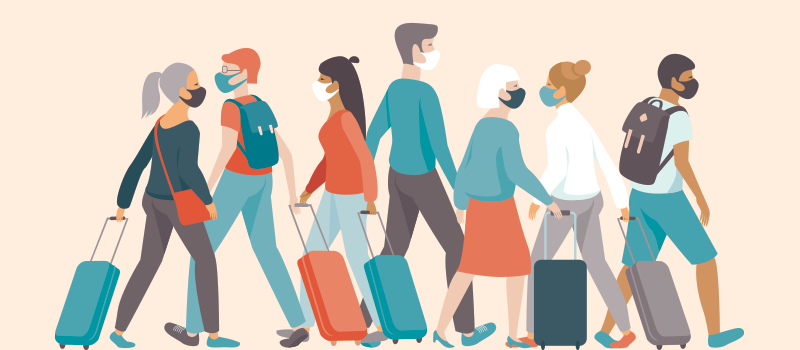What’s the Buzz
The Bee Healthy Blog
Should I Still Wear a Mask While Traveling?

In April 2022, a Federal judge voided the Transportation Security Administration’s (TSA) mask rules for airports, airplanes, and other types of public transit. This has created great confusion about the mask requirement while traveling on various forms of public transit and in indoor public spaces. But what does the science say? Is masking a good idea while traveling? Let’s find out.
Are masks effective against the coronavirus disease?
Experts say that masks can help limit the spread of respiratory diseases like COVID-19. However, masks alone cannot stop viral infections. Therefore, masks should be used as part of a comprehensive strategy to reduce virus transmission.
Do I need a mask outside, alone?
The Centers for Disease Control and Prevention (CDC) says that masks are not needed when you are outside alone, away from other people, or with people living in your household. However, masks are still recommended in indoor public settings and at large public outdoor gatherings such as sporting events and concerts.
Is the Federal mask mandate still in effect?
The Federal mask mandate is no longer in effect as of April 18, 2022. The CDC is no longer enforcing the use of masks on public transportation. But public health experts continue to recommend that people wear masks in indoor public transportation settings.
Are airlines enforcing mask-wearing?
Major airlines like Alaska, American, Delta, Frontier, JetBlue, Southwest, Spirit, and United have lifted their mask mandates. However, if you are flying to international destinations, there may still be mask mandates in place based on rules at your place of arrival.
What is the risk of getting coronavirus on a plane?
The air quality on an airplane is better than in most other indoor environments for several reasons. The cabin air exchange occurs 10 times more often than in most office buildings. The air in the cabin is a mix of HEPA-filtered air and fresh air. HEPA filters can remove 99.9% of viruses and bacteria from the air. Also, the air flows top to bottom and not along the length of the aircraft.
Along with these cabin air features, using masks on board airplanes and the requirements for tests and/or vaccination status make the risk of contracting COVID-19 during air travel very low.
Should I wear a mask on an airplane?
The mask mandate has been tossed, so wearing masks on an airplane is not compulsory. But even though it is a personal choice, experts recommend wearing a mask for the entire flight to protect yourself from coronavirus.
Besides air travel, masks are recommended for other forms of mass transit, such as taxis, subways, trains, and ferries, where social distancing is impossible.
Do you still have to wear masks if you get the COVID-19 vaccine?
Infectious disease experts say that passengers on airplanes and other mass transit should continue wearing masks even if they are vaccinated and have received boosters. This is because, with the mask mandate gone, travelers may find themselves exposed to a large number of maskless people.
Also, while the US has overall high vaccination rates, if you are traveling overseas to a country where vaccination rates are comparatively lower and/or there are a large number of new daily cases, you are at higher risk of contracting the coronavirus disease.
To stay safe, you should be up to date with your COVID-19 vaccines and boosters, avoid crowds as much as possible, practice regular hand-washing, and wear well-fitting N95 or surgical masks. These steps will help to protect you and other passengers during travel.
What are CDC recommendations for masks on public transport?
The CDC recommends that everyone over the age of 2 remain masked with a properly-fitted mask covering the nose and mouth in indoor areas such as airports, airplanes, train stations, trains, bus stations, buses, seaports, cruise ships, and ferries. It is especially important to wear a mask when:
- Public transportation is crowded.
- You are in an area with poor ventilation, such as an airport jetway or an airplane with the engine off.
- During long-distance domestic travel or international travel.
- If you are at high risk of getting sick from COVID-19.
- If coronavirus cases in your community are high.
You should not use public transportation if you came in close contact with someone who has COVID-19 and is in quarantine or if you have COVID-19 and it is within 10 days of symptom onset or a positive test.
What type of mask should I wear on public transportation?
Even though masks are no longer required, experts continue to recommend wearing a mask on public transportation. The N95 mask offers the best protection to passengers on planes and other forms of public transportation, followed by a KN95 mask, surgical mask, and cloth mask, in that order. The fit of the mask is also important. Loose masks allow pathogens like the SARS-CoV-2 virus to be transmitted.
Wear a mask regardless of mask rules and travel without fear
As the coronavirus pandemic continues, most people are getting back to normal life. There has been some confusion over masking, but if you are up to date on your vaccinations, wear a well-fitted N95 on public transportation, and understand that treatment is available should you get sick with COVID-19, then you can catch your next flight without worries.
References:

SOCIAL